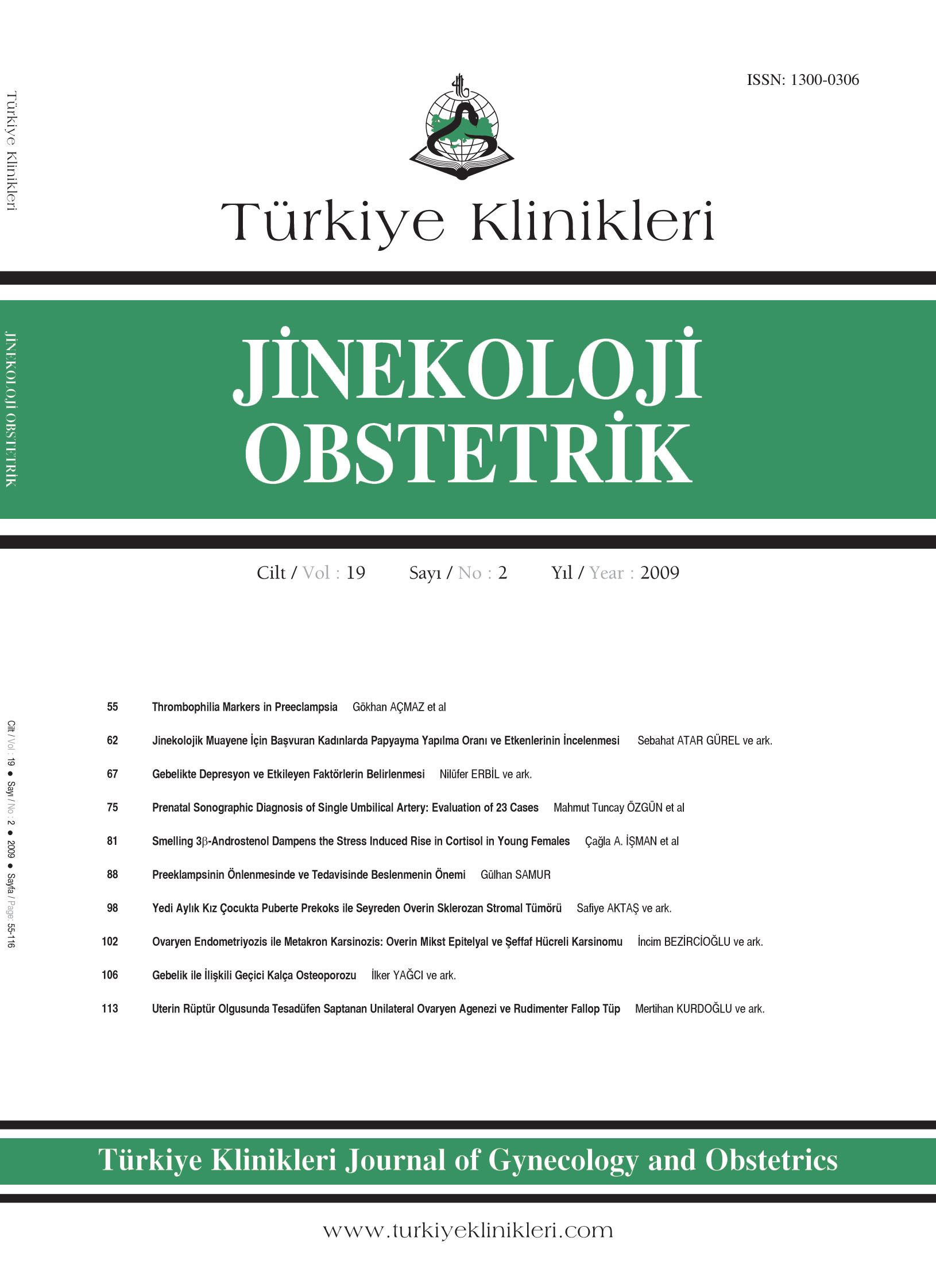Open Access
Peer Reviewed
ORIGINAL RESEARCH
4442 Viewed2198 Downloaded
Determination of Depression and Affecting Factors in Pregnancy
Gebelikte Depresyon ve Etkileyen Faktörlerin Belirlenmesi
Turkiye Klinikleri J Gynecol Obst. 2009;19(2):67-74
Article Language: TR
Copyright Ⓒ 2025 by Türkiye Klinikleri. This is an open access article under the CC BY-NC-ND license (http://creativecommons.org/licenses/by-nc-nd/4.0/)
ÖZET
Amaç: Bu çalışmanın amacı, gebelikte depresyon sıklığını ve etkileyen faktörleri belirlemektir. Gereç ve Yöntemler: Tanımlayıcı ve kesitsel tipte planlanan araştırmanın evreni, Ordu Kadın-Doğum ve Çocuk Hastalıkları Hastanesi Obstetri polikliniğine başvuran gebe kadınlardan oluştu. Araştırmanın örneklemine araştırmaya katılmayı kabul eden 204 gebe kadın alındı. Araştırma 26 Şubat-27 Nisan 2007 tarihleri arasında yapıldı. Veriler, anket formu ve Türkçeye uyarlanması Hisli (1988) tarafından yapılan Beck Depresyon Envanteri (1978) ile toplandı. Verilerin analizi, bilgisayarda SPSS 11.5 istatistik paket programında sıklık, yüzde, aritmetik ortalama, ki-kare testi, Pearson korelasyon analizi ve Cronbach Alfa güvenirlik analiz testi ile yapıldı. Bulgular: Araştırmada 204 gebenin 63 (%30.9)'ünün tedavi gerektiren düzeyde depresyon semptomları yaşadığı belirlendi. Gebenin eğitim seviyesi, mesleği, eşinin eğitim seviyesi, gelir algısı, geçmişte psikiyatrik sorun yaşama, daha önceki gebeliklerinde psikiyatrik sorun yaşama, bu gebeliğinde fiziksel sorun yaşama, gebeliğin istenmemesi, fetus ve kendi sağlığı hakkında kaygı yaşama ve gebeliğinde akrabalardan destek almama gibi faktörlerin gebelerin depresyon semptom şiddetini etkilediği ve gruplar arasında istatistiksel olarak anlamlı fark olduğu belirlendi (p< 0.05). Sonuç: Gebelerde depresyon yaygın bir sağlık problemidir. Gebelikte depresyon gelişiminde birçok risk faktörü vardır. Bu nedenle gebelerde depresyonun ve risk faktörlerinin izlemi oldukça önemlidir.
Amaç: Bu çalışmanın amacı, gebelikte depresyon sıklığını ve etkileyen faktörleri belirlemektir. Gereç ve Yöntemler: Tanımlayıcı ve kesitsel tipte planlanan araştırmanın evreni, Ordu Kadın-Doğum ve Çocuk Hastalıkları Hastanesi Obstetri polikliniğine başvuran gebe kadınlardan oluştu. Araştırmanın örneklemine araştırmaya katılmayı kabul eden 204 gebe kadın alındı. Araştırma 26 Şubat-27 Nisan 2007 tarihleri arasında yapıldı. Veriler, anket formu ve Türkçeye uyarlanması Hisli (1988) tarafından yapılan Beck Depresyon Envanteri (1978) ile toplandı. Verilerin analizi, bilgisayarda SPSS 11.5 istatistik paket programında sıklık, yüzde, aritmetik ortalama, ki-kare testi, Pearson korelasyon analizi ve Cronbach Alfa güvenirlik analiz testi ile yapıldı. Bulgular: Araştırmada 204 gebenin 63 (%30.9)'ünün tedavi gerektiren düzeyde depresyon semptomları yaşadığı belirlendi. Gebenin eğitim seviyesi, mesleği, eşinin eğitim seviyesi, gelir algısı, geçmişte psikiyatrik sorun yaşama, daha önceki gebeliklerinde psikiyatrik sorun yaşama, bu gebeliğinde fiziksel sorun yaşama, gebeliğin istenmemesi, fetus ve kendi sağlığı hakkında kaygı yaşama ve gebeliğinde akrabalardan destek almama gibi faktörlerin gebelerin depresyon semptom şiddetini etkilediği ve gruplar arasında istatistiksel olarak anlamlı fark olduğu belirlendi (p< 0.05). Sonuç: Gebelerde depresyon yaygın bir sağlık problemidir. Gebelikte depresyon gelişiminde birçok risk faktörü vardır. Bu nedenle gebelerde depresyonun ve risk faktörlerinin izlemi oldukça önemlidir.
ANAHTAR KELİMELER: Gebelik, depresyon, risk faktörleri
ABSTRACT
Objective: The aim of this study is to determine the level of depression and affecting factors in pregnancy. Material and Methods: The population of this descriptive and cross-sectional study was consisted of the pregnant women consulting to Obstetric Policlinic of Maternity and Children Hospital in Ordu. The 204 pregnant who accepted to take part in the study created the sample of the study. The study was made between February 26, 2007 and April 27, 2007. The data were gathered with a questionnaire form and Beck Depression Inventory (1978) whose validity and confidence studies were made by translating into Turkish by Hisli (1988). The analysis of the data was done with frequency, percentage, arithmetic average, chi-square test, Pearson correlation analysis test and Cronbach Alpha reliability test in SPSS 11.5 statistic program on computer. Results: It was determined that 63 (30.9%) of the 204 pregnants were to be experiencing depression at a level requiring treatment in the research. It was determined that the education level of the pregnant, their occupation, the education of husbands, the perception of income, having a psychological problem in the past, having a psychological problem in the previous pregnancies, having a physical problem in this pregnancy, unwilling pregnancy, worrying about the health of the fetus and self, having no support from the relatives are the factors affecting the depression symptoms and the difference among the groups is statistically significant (p< 0.05). Conclusion: Depression among pregnants is common health problem. The development of depression in pregnancy is influenced by many risk factors. For this reason, observation of risk factors and depression among pregnants are fairly important.
Objective: The aim of this study is to determine the level of depression and affecting factors in pregnancy. Material and Methods: The population of this descriptive and cross-sectional study was consisted of the pregnant women consulting to Obstetric Policlinic of Maternity and Children Hospital in Ordu. The 204 pregnant who accepted to take part in the study created the sample of the study. The study was made between February 26, 2007 and April 27, 2007. The data were gathered with a questionnaire form and Beck Depression Inventory (1978) whose validity and confidence studies were made by translating into Turkish by Hisli (1988). The analysis of the data was done with frequency, percentage, arithmetic average, chi-square test, Pearson correlation analysis test and Cronbach Alpha reliability test in SPSS 11.5 statistic program on computer. Results: It was determined that 63 (30.9%) of the 204 pregnants were to be experiencing depression at a level requiring treatment in the research. It was determined that the education level of the pregnant, their occupation, the education of husbands, the perception of income, having a psychological problem in the past, having a psychological problem in the previous pregnancies, having a physical problem in this pregnancy, unwilling pregnancy, worrying about the health of the fetus and self, having no support from the relatives are the factors affecting the depression symptoms and the difference among the groups is statistically significant (p< 0.05). Conclusion: Depression among pregnants is common health problem. The development of depression in pregnancy is influenced by many risk factors. For this reason, observation of risk factors and depression among pregnants are fairly important.
MENU
POPULAR ARTICLES
MOST DOWNLOADED ARTICLES





This journal is licensed under a Creative Commons Attribution-NonCommercial-NoDerivatives 4.0 International License.










